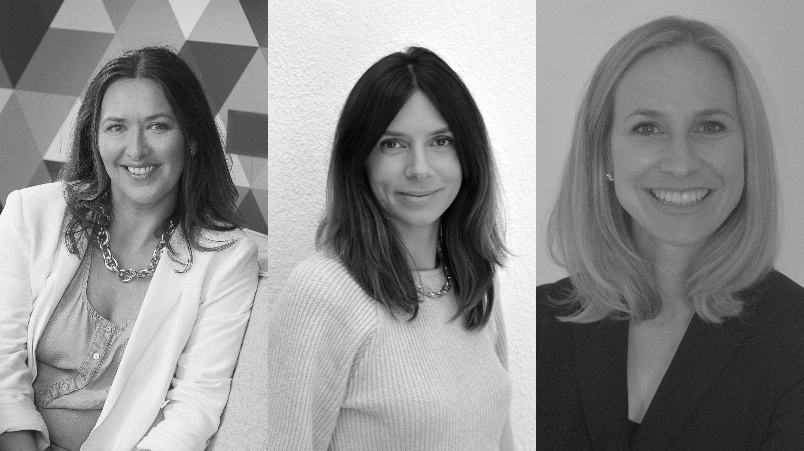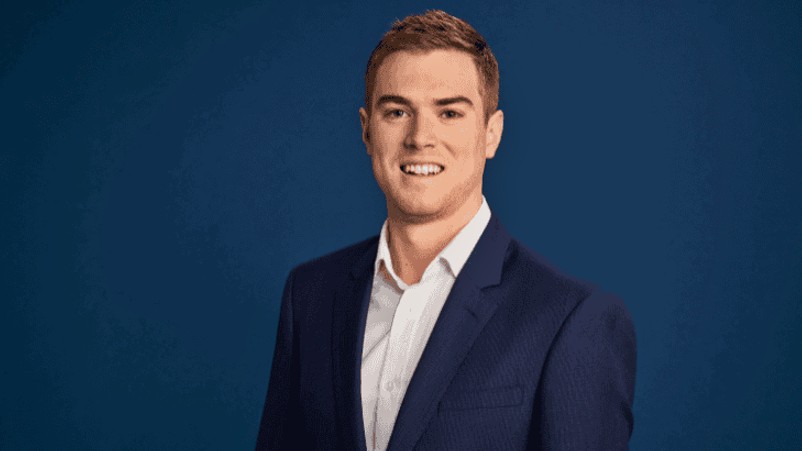The Marketing Academy 2022 intake: Tourism Tasmania’s Emma Terry, Aje’s Kate Thomas, Salesforce’s Renata Bertram on talent skirmishes for contractors, being a perpetual apprentice, and first marketing campaign (for a dog)
Six months into The Marketing Academy's 2022 Scholarship programme, Mi3 asked the class of '22 for their take on the key lessons to date. Aje’s Marketing Director, Kate Thomas, Tourism Tasmania CMO Emma Terry and Salesforce’s Vice President of Marketing ANZ, Renata Bertram, talk challenging times for talent, shorter attention spans, bursting the marketing bubble and what consultancy thinking gets wrong on diversity of thought.

Left to right: Salesforce's Renata Bertram, Aje's Kate Thomas, Tourism Tasmania's Emma Terry.
Kate Thomas, Marketing Director, Aje
TMA so far: What’s the single most valuable insight gleaned?
The insights have streamed constantly throughout the TMA experience – to narrow it down to just one is almost impossible!
However, the biggest theme that has emerged for me relates to communication and how the shift from good to great leadership stems from the language you use. We often talk about ‘how’ you say things (verbally and through body language), but the biggest ‘a-ha’ moment for me has been that ‘what’ you say is the key to unlocking potential in your team.
By framing questions and conversations in a more effective and open-ended way, you can allow your team to feel ownership and accountability for decisions, enabling them to reach a conclusion without ‘telling them the answer’ and ensuring they recognise their own ability to find the best course of action.
This has been mirrored in my mentoring sessions (where we are lucky enough to have one to one face time with eight of Australia’s leading marketers and creative business leaders). These people have become powerhouses because they know very specifically how and what to communicate to their teams for highly effective outcomes.
How to nail the TMAs entry requirements?
I am sure the entire cohort will echo this, but mostly just: be yourself.
My entry video was about my first ‘marketing campaign’ as a kid (I lobbied my parents for a dog through an extensive marketing effort…!). There is nothing too obscure, small – or large – that you can feature.
What I really want to emphasise, however, is: do not worry about production values with your entry video. I was lucky enough to collaborate with my good friend Mike at Serious Levity who produced a professional video for me, but if you don’t have access to a talented network – something filmed on your phone camera is more than enough. It’s the showcase of the ‘real you’, not production, that the panellists are after.
Finally, once you are through to the final rounds, you will be astonished by the high-calibre marketers and business leaders who interview you! Don’t be afraid, they are absolutely on your side and the experience will be a pleasure.
Best piece of advice you’ve ever been given & why?
Be polite to everyone. There is nothing that reaps more fulfilling rewards.
The greatest professional lesson you have relearned/assumption to explode?
Humans are unique and we all resolve problems in completely different ways. Often, there is no correct answer or one ‘right way’. Consultancy thinking eschews this notion, whereas I’ve learned that diversity of thought is where the sweet stuff lies.
Greatest capability gap (individually & within your teams)?
As a high growth business, our capability is limited by our ability to evolve processes at the rate in which we are growing. As such, we have made 2022 the Year of The Process and are reviewing both our critical path and go-to-market processes to minimise points of friction and maximise time that can be spent on creativity, innovation and thinking about our customers.
Talent crisis: What’s the impact on your teams, how to navigate (what is keeping people from moving on?)
As a company growing exponentially year on year – we require teams who can ‘act now’ but also picture what the future scale needs to look like. I’m very lucky that I work with a team of high performers who can do this. But identifying new specialists with global experience to join us can take much longer than it has historically.
Emma Terry, CMO, Tourism Tasmania
TMA so far: What’s the single most valuable insight gleaned?
Chris Savage in his presentation to us quoted Trevor Hendy who famously said, “Conditions are always perfect”. To me, this insight nicely wraps in a number of Leadership themes around perspective, 100 per cent radical responsibility, and being able to be responsive and adaptive to changing conditions – a critical leadership skill in the BANI (Brittle, Anxious, Non-linear and Incomprehensible) world in which we are now living. Marketing continues to see greater fragmentation and shorter attention spans. To being able to apply ‘conditions are always perfect’ ensures we see opportunities out of challenge and lead in this ever-changing world.
How to nail the TMAs entry requirements?
It’s not just about what you have achieved, it’s about ‘who you are’ and your readiness and capacity to take the next step in your leadership journey. TMA has a deep purpose to shape leaders and change makers. This type of work requires a commitment to being vulnerable, staying open and curious, and being willing to learn and share. So be yourself and reflect on how TMA will shape you, your work and impact on the world.
Best piece of advice you’ve ever been given & why?
The best piece of advice I have ever been given is that it is OK to be the apprentice when honing new skills. The skills that have got us to this point aren’t necessarily the skills that will get you to the next point. Instead of beating yourself up that you aren’t a great presenter, or people leader or networker, reframe it to being an apprentice and to nurture yourself and the growth of these skills. It’s OK not to know it all and to be learning.
The greatest professional lesson you have relearned/assumption to explode?
It’s not OK for a leader to hit the wall. Simple, obvious and, until I heard those words, somewhat elusive to me. It was a big wake up call. I was operating on the internal narrative that leaders need to work hard and flog yourself for the team and for the business. The reality is if you aren’t in good shape, centred, mentally well, then you cannot effectively lead others and this extends beyond work to your personal relationships. Think of it as the flight attendant instruction of securing your own mask before helping others.
Greatest capability gap (individually & within your teams)?
For the rapidly changing world we are operating within, the capability gap that is becoming more obvious is ‘whole of systems’ thinking and to be able to translate that into actionable outcomes. I believe we often operate in bubbles and, as a result, we must work harder and harder to pop those bubbles and stay connected to the broader world around us.
Talent crisis: What’s the impact on your teams, how to navigate (what is keeping people from moving on?)
The talent crisis requires a greater emphasis of building skills across the team to enable a greater coverage of the work program. This is a balance of deep technical skills and more general skills to be able to swing across to deliver programs as required. I believe having a business with a strong purpose and values set is a must. We have invested in our own Unordinary Leaders program that focuses on personal development even more so than professional development with the intent of empowering and enabling our team to thrive.
Renata Bertram, Vice President, Marketing, Australia and New Zealand, Salesforce
TMA so far: What’s the single most valuable insight gleaned?
Of all the questions have found this the most difficult to answer because there have been SO many valuable insights – literally a lot. The valuable insight I want to share is something that really resonated with me in terms of what I believe my role is – it would be like my legacy and make me feel complete if I do it well. TMA is “about how many OTHER leaders you develop and create”. If I can make others better people and leaders than when I started to work with them, it provides me with a compass and anchor upon which I am held accountable and drives my behaviour.
How to nail the TMAs entry requirements?
It is a very robust and intense process – probably more so than any job I have interviewed for. So don’t leave it to the last minute and give yourself ample time to prepare. It is not just about the amazing work you do, but also about the amazing person you are – and perhaps most important, what are your dreams, aspirations, and the obstacles and areas for development you need to focus on. And be true to yourself and who you are – aka authentic. The interviewers/panellists will smell inauthenticity a mile away!
Best piece of advice you’ve ever been given & why?
Growth and Comfort will never co-exist. You have to get comfortable with being uncomfortable. Step out of your comfort zone to grow! If I am feeling too comfortable, I know it’s time to take me out that zone and into the one that is harder and uncomfortable – but invariably gets me to grow.
The greatest professional lesson you have relearned/assumption to explode?
You can teach an old dog new tricks! Life is a journey of learning – one can reinvent oneself, reskill oneself, have multiple careers if one wants. It requires the right mindset.
Greatest capability gap (individually & within your teams)?
Everything is important! Prioritisation and, associated with this, I would say courageous conversations.
Talent crisis: What’s the impact on your teams, how to navigate (what is keeping people from moving on?)
In the past, finding contractor-type resources was easy. There was a great pool of talent willing and available to dive into work that was not permanent. Today is very different. Contractor-type resources are scarce, and the minute you find a suitable contractor, they are offered a permanent role. When offering permanent roles, the war on talent is real. Candidates are in the driver’s seat, able to negotiate and ask for what they want and desire – salary, benefits and working conditions. Candidates are expecting more from employers – flexibility on where and how they work, or rather ‘let me work where I want and let me deliver outcomes’. And they also really care about what the company’s values are, what they stand for, and the care and investment they make in their people. At Salesforce, we strive to create a culture where we do well and do good for our customer, community and employees. Offering work flexibility, driving connection, opportunities to give back, development and career opportunities, focus on outcomes, great managers and leaders, and competitive compensation packages are all things we focus on to keep people from moving on and, touch wood, the attrition over last few years has been minimal.


